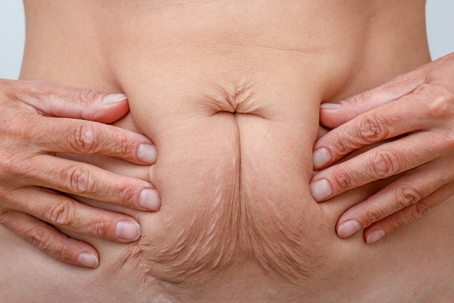Estimated Reading Time: 7 minutes.
Table of Contents
- What Determines the Severity of Loose or Sagging Skin After Weight Loss
- What You Can Control
- When Loose Skin Becomes More Than Cosmetic
- Supporting Your Skin and Confidence with Soza Weight Loss
Losing weight is an incredible milestone both physically and emotionally. But sometimes, the skin does not adjust as quickly as the rest of your body. When your skin has been stretched for a long time, it can lose its natural elasticity, much like a balloon that has stayed inflated for too long.
The science behind loose skin after weight loss is straightforward. Skin contains collagen and elastin, two proteins that give it structure and flexibility. When you gain weight, the skin expands to accommodate extra fat tissue. Over time, those supportive fibers weaken. When weight is lost, they may not return to their previous firmness or strength.
Skin elasticity depends on factors like age, genetics, and overall health. This explains why some people experience smooth, gradual tightening while others notice more visible sagging.
What Determines the Severity of Loose or Sagging Skin After Weight Loss
Not all skin responds to weight loss the same way. Some individuals see noticeable tightening within months, while others have lingering sagging skin that feels difficult to improve. Several factors determine how your skin adapts:
- Rate and Amount of Weight Loss
Skin needs time to adjust. Losing a large amount of weight rapidly, such as through crash diets or extreme regimens, gives the skin less opportunity to retract naturally.
- Age and Collagen Production
Younger individuals often have more resilient skin because collagen and elastin are produced more efficiently. As we age, production slows, which makes the skin less able to bounce back.
- Duration of Weight Gain
The longer the skin remains stretched, the more likely it is to lose its structure. Someone who has carried extra weight for decades will likely have more laxity than someone who gained and lost weight within a shorter time.
- Genetics and Skin Type
Some people naturally have more elastic skin. Factors such as thickness, hydration, and collagen density influence how well the skin adapts after weight loss.
- Lifestyle Influences
Sun exposure, smoking, dehydration, and poor nutrition all affect skin quality. Research from Healthline notes that UV rays and toxins can break down collagen, leaving the skin weaker and more prone to sagging.
What You Can Control
While you cannot change your genes or age, you can influence other factors that affect how your skin recovers after weight loss.
- Take it slow. Gradual and sustainable weight loss allows your skin to adapt naturally to the changes happening beneath it. Rapid weight loss is more likely to result in loose or sagging skin.
- Build muscle. Strength training can help fill out some of the lost volume, supporting the skin’s structure and improving your overall shape. Building lean muscle helps create a smoother appearance and supports better skin tightening after weight loss.
- Prioritize nutrition. Protein, vitamins C and E, omega-3 fatty acids, and proper hydration all support collagen production and healthy skin repair. A nutrient-rich diet promotes better elasticity and long-term skin health.
- Stay consistent. Good habits like wearing sunscreen, avoiding smoking, and staying hydrated help maintain strong and resilient skin.
- Give it time. Even after reaching your goal weight, your skin continues to adjust. Some improvement happens naturally over several months or even years.
When Loose Skin Becomes More Than Cosmetic
For many people, loose skin is simply part of the transformation story. For others, it can cause physical discomfort, hygiene concerns, or emotional frustration. Chafing, restricted movement, and difficulty finding clothes that fit comfortably are common challenges.
At that point, professional treatments can make a real difference. Advances in non-surgical skin tightening now make it possible to tone and firm skin without surgery. Radiofrequency, ultrasound, and other energy-based treatments stimulate collagen production beneath the surface, improving firmness and texture over time.
When the amount of excess skin is significant, surgical contouring may be an option. The decision depends on your goals, comfort level, and how much the skin affects your daily life. Consulting a qualified professional can help determine the most appropriate path forward.
Supporting Your Skin and Confidence with Soza Weight Loss
At Soza Weight Loss, we understand that your journey does not end when you reach your target weight. Maintaining confidence after weight loss often means addressing changes in skin tone and elasticity, too.
Our skin tightening program uses advanced, non-invasive technologies that stimulate collagen and help firm areas of loose skin after weight loss. These treatments are gentle, effective, and tailored to your unique needs.
In addition, our comprehensive weight loss programs combine personalized nutrition, lifestyle coaching, and long-term support to help you achieve sustainable results. We focus on more than just the number on the scale. Our goal is to help you feel comfortable and confident in your body at every stage of your transformation.
Our team at Soza Weight Loss combines science, technology, and compassionate care to help you look and feel your best. From achieving healthy weight loss to improving skin elasticity and contour, we provide the tools and expertise you need to continue your success with confidence.
If sagging skin is keeping you from fully enjoying the results of your hard work, know that effective and comfortable solutions are available. Call Soza Weight Loss at (504) 475-9817 or fill out our online formto book an appointment.

